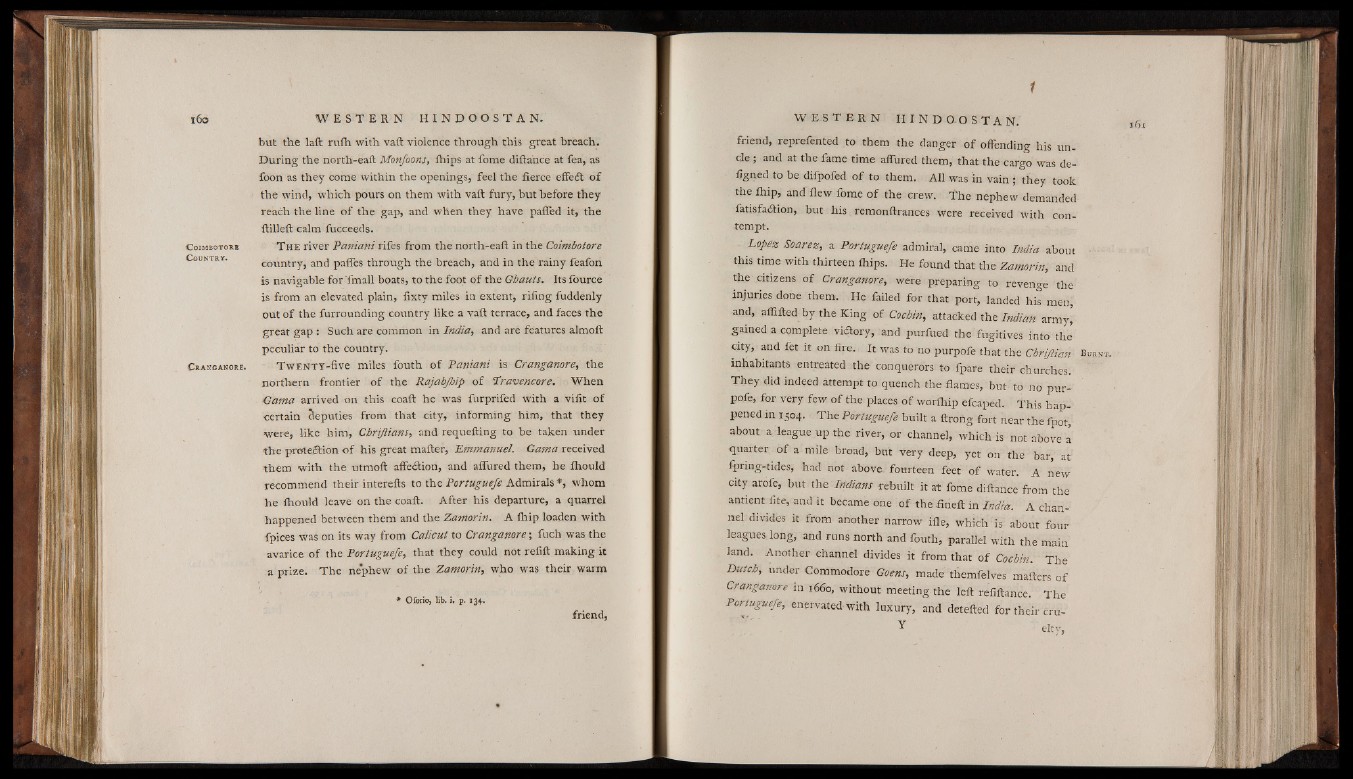
but the laft ruth with vaft violence through this great breach.
During the north-eaft Monfoons, ihips at fome diftance at fea, as
foon as they come within the openings, feel the fierce effeit of
the wind, which pours on them with vaft fury, but before they
reach the line o f the gap, and when they have pafied it, the
ftilleft calm fucceeds.
Coimbotore T he river Paniani rifes from the north-eaft in the Coimbotore
country, and paffes through the breach, and in the rainy feafon
is navigable for fmall boats, to the foot of the Ghauts. Its fource
is from an elevated plain, fixty miles in extent, riling fuddenly
out of the furrounding country like a vaft terrace, and faces the
great gap : Such are common in India, and are features almoft
peculiar to the country.
C r a n g a n o r e . T w E N T Y - f i v e miles fouth of Paniani is Cranganore, the
northern frontier o f the RajahJljip of Pravencore. When
Gama arrived on this coaft he was furprifed with a vilit of
certain deputies from that city, informing him, that they
were, like him, Cbri/lians, and requefting to be taken under
the prcrte&ion o f his great mafter, Lmmanuel. Gama received
them with the utmoft affedtion, and allured them, he Ihould
recommend their interefts to the Portuguefe Admirals *, whom
he ihould leave on the coaft. After his departure, a quarrel
happened between them and the Zamorin. A Ihip loaden with
fpices was on its way from Calicut to Cranganore; fuch was the
avarice of the Portuguefe, that they could not refill making it
a prize. The ne*phew of the Zamorin, who was their warm
* Oforio, lib. i. p. 134.
friend,
friend, reprefented to them the danger o f offending his uncle
; and at the fame time affured them, that the cargo was de-
figned to be dilpofed o f to them. All was in vain ; they took
the ihip, and flew fome of the crew. The nephew demanded
fatisfadtion, but his remonftrances were received with contempt.
. Lopez Soarez, a Portuguefe admiral, came into India about
this time with thirteen Ihips. He found that the Zamorin, and
the citizens of Cranganore, were preparing to revenge the
injuries done them. He failed for that port, landed his men,
and, aflifted by the King of Cochin, attacked the Indian army,
gained a complete vidory, and purfued the fugitives into the
city, and fet it on fire. It was to no purpofe that the Chrijlian Burnt.
inhabitants entreated the conquerors to fpare their churches.
They did indeed attempt to quench the flames, but to no purpofe,
for very few of the places o f worlhip efcaped. This happened
in 1504. The Portuguefe built a ftrong fort near the fpot,
about a league up the river, or channel, which is not above I
quarter of a mile broad, but very deep, yet on the bar, at
Ipring-tides, had not above fourteen feet o f water. A hew
city arofe, but the Indians rebuilt it at fome diftance from the
antient fite, and it became one o f the fineft in India. A channel
divides it from another narrow ifle, which is about four
leagues long, and runs north and fouth, parallel with the main
land. Another channel divides it from that of Cochin. The
Dutch, under Commodore Goens, made themfelves mailers of
Cranganore in 1660, without meeting the left refinance. The
Portuguefe, enervated with luxury, and detefted for their cruelty,